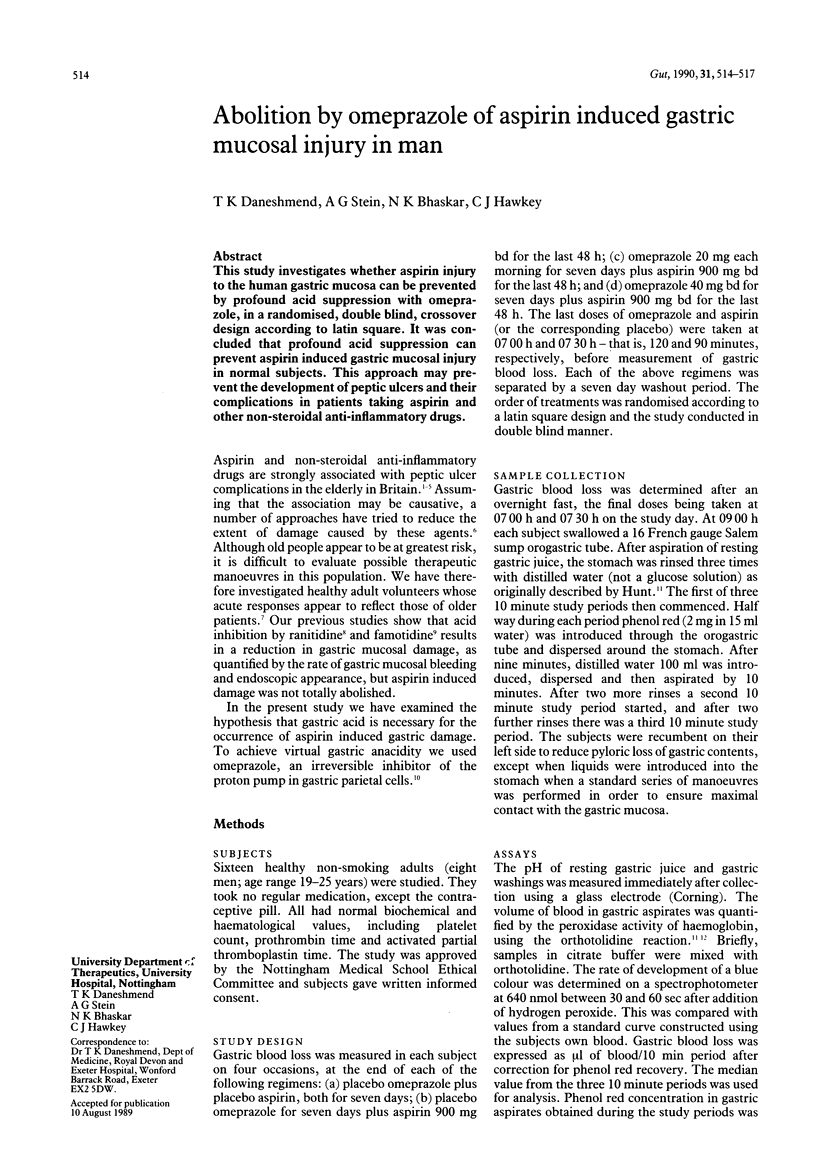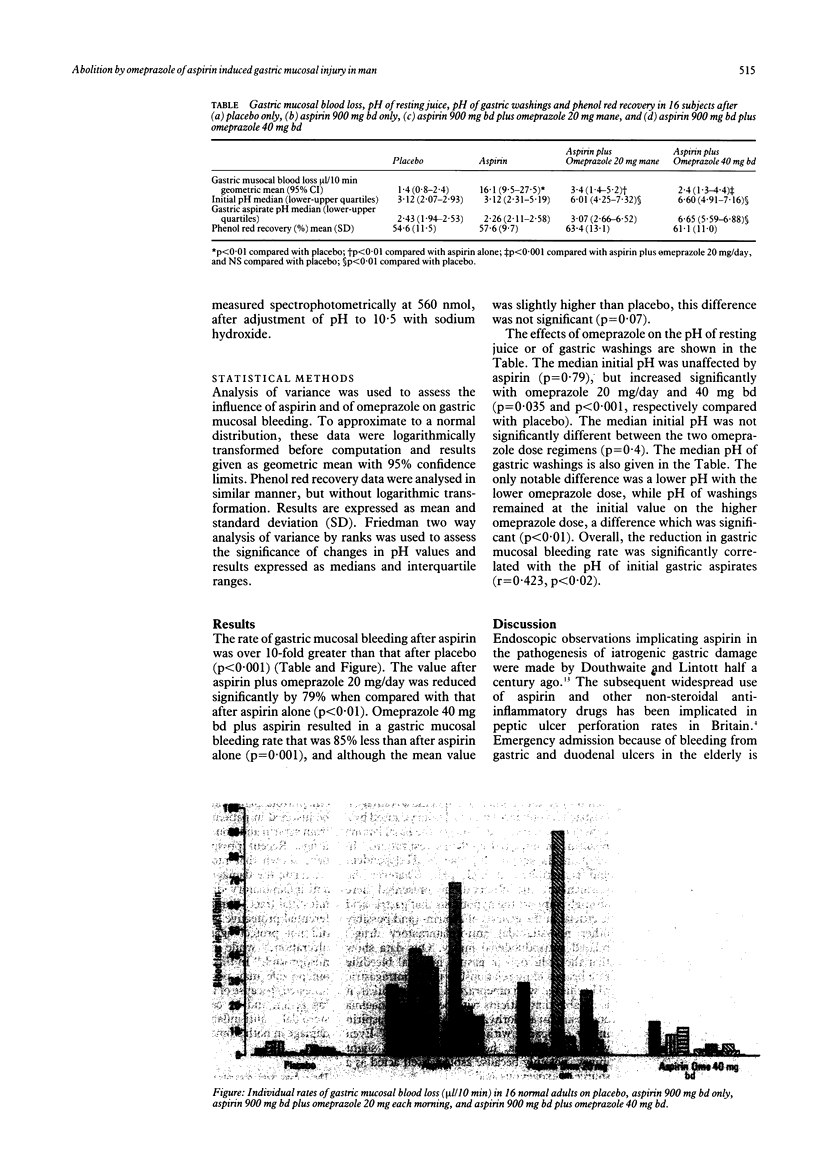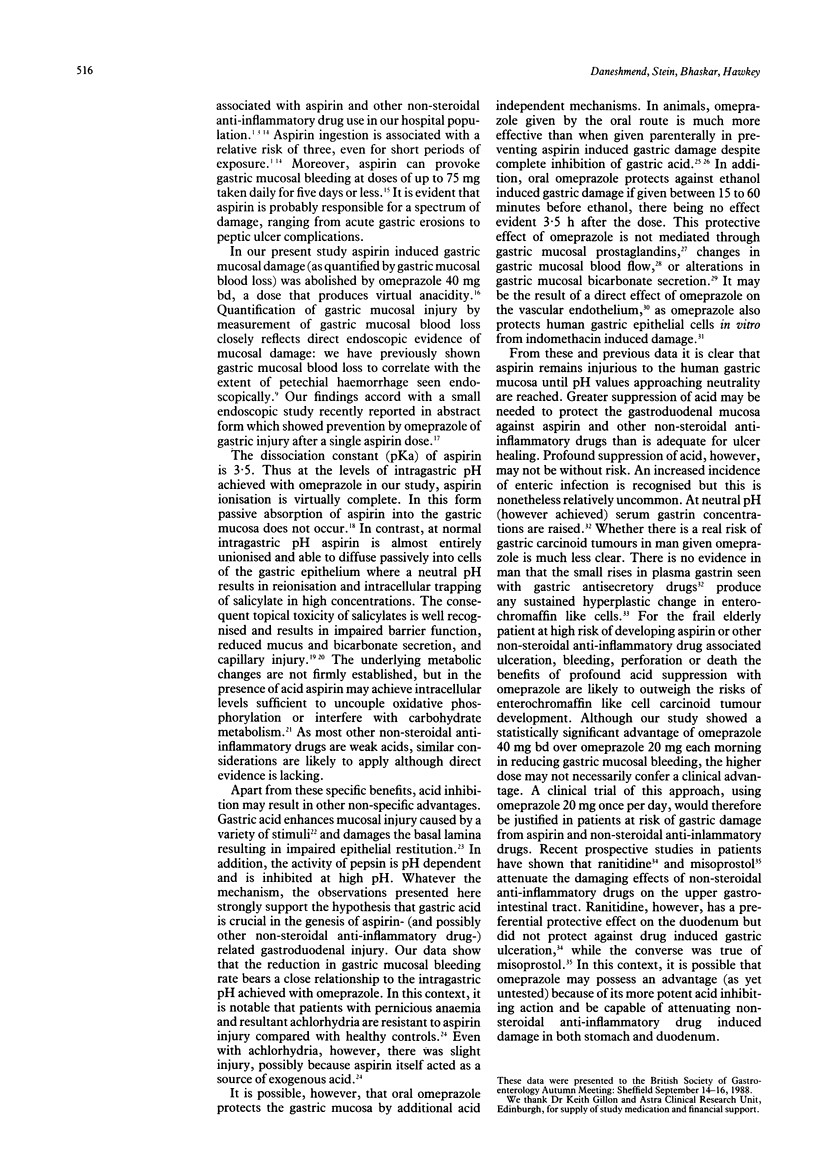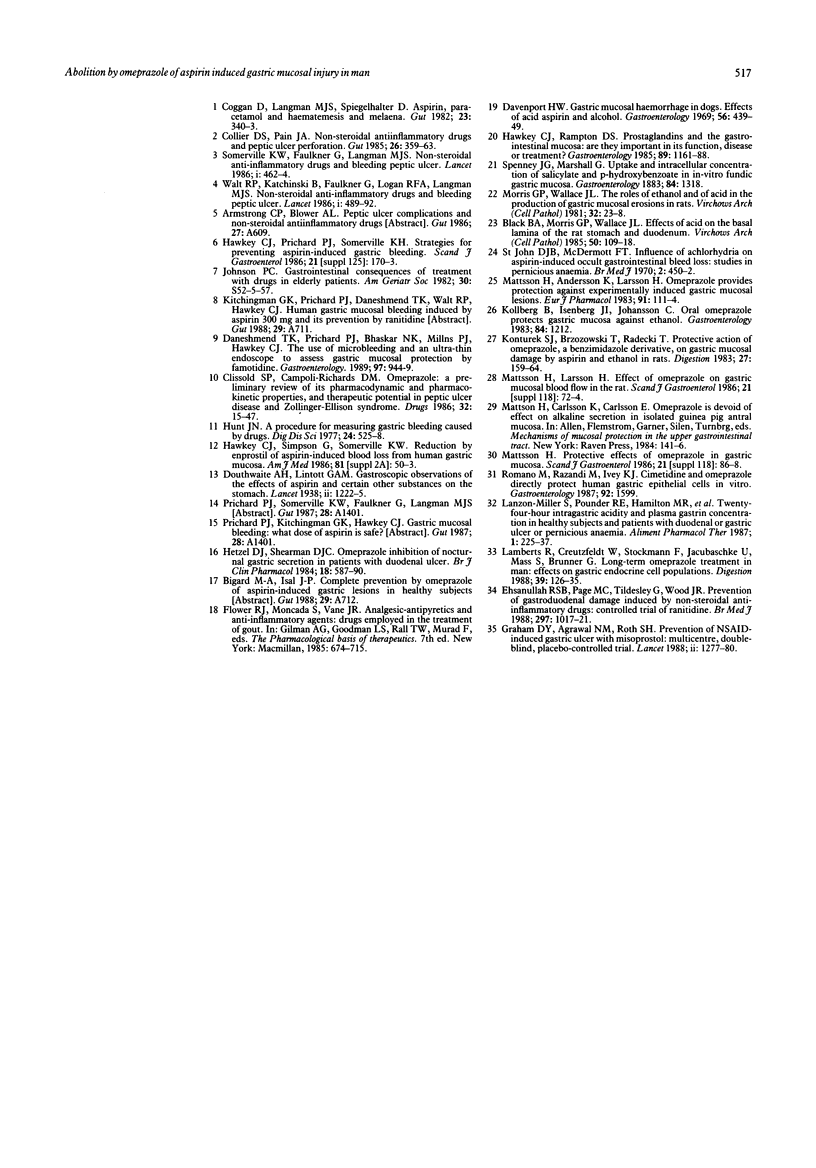Abstract
This study investigates whether aspirin injury to the human gastric mucosa can be prevented by profound acid suppression with omeprazole, in a randomised, double blind, crossover design according to latin square. It was concluded that profound acid suppression can prevent aspirin induced gastric mucosal injury in normal subjects. This approach may prevent the development of peptic ulcers and their complications in patients taking aspirin and other non-steroidal anti-inflammatory drugs.
Full text
PDF



Selected References
These references are in PubMed. This may not be the complete list of references from this article.
- Black B. A., Morris G. P., Wallace J. L. Effects of acid on the basal lamina of the rat stomach and duodenum. Virchows Arch B Cell Pathol Incl Mol Pathol. 1985;50(2):109–118. doi: 10.1007/BF02889895. [DOI] [PubMed] [Google Scholar]
- Clissold S. P., Campoli-Richards D. M. Omeprazole. A preliminary review of its pharmacodynamic and pharmacokinetic properties, and therapeutic potential in peptic ulcer disease and Zollinger-Ellison syndrome. Drugs. 1986 Jul;32(1):15–47. doi: 10.2165/00003495-198632010-00002. [DOI] [PubMed] [Google Scholar]
- Coggon D., Langman M. J., Spiegelhalter D. Aspirin, paracetamol, and haematemesis and melaena. Gut. 1982 Apr;23(4):340–344. doi: 10.1136/gut.23.4.340. [DOI] [PMC free article] [PubMed] [Google Scholar]
- Collier D. S., Pain J. A. Non-steroidal anti-inflammatory drugs and peptic ulcer perforation. Gut. 1985 Apr;26(4):359–363. doi: 10.1136/gut.26.4.359. [DOI] [PMC free article] [PubMed] [Google Scholar]
- Daneshmend T. K., Prichard P. J., Bhaskar N. K., Millns P. J., Hawkey C. J. Use of microbleeding and an ultrathin endoscope to assess gastric mucosal protection by famotidine. Gastroenterology. 1989 Oct;97(4):944–949. doi: 10.1016/0016-5085(89)91502-3. [DOI] [PubMed] [Google Scholar]
- Davenport H. W. Gastric mucosal hemorrhage in dogs. Effects of acid, aspirin, and alcohol. Gastroenterology. 1969 Mar;56(3):439–449. [PubMed] [Google Scholar]
- Ehsanullah R. S., Page M. C., Tildesley G., Wood J. R. Prevention of gastroduodenal damage induced by non-steroidal anti-inflammatory drugs: controlled trial of ranitidine. BMJ. 1988 Oct 22;297(6655):1017–1021. doi: 10.1136/bmj.297.6655.1017. [DOI] [PMC free article] [PubMed] [Google Scholar]
- Graham D. Y., Agrawal N. M., Roth S. H. Prevention of NSAID-induced gastric ulcer with misoprostol: multicentre, double-blind, placebo-controlled trial. Lancet. 1988 Dec 3;2(8623):1277–1280. doi: 10.1016/s0140-6736(88)92892-9. [DOI] [PubMed] [Google Scholar]
- Hawkey C. J., Prichard P. J., Somerville K. W. Strategies for preventing aspirin-induced gastric bleeding. Scand J Gastroenterol Suppl. 1986;125:170–173. doi: 10.3109/00365528609093834. [DOI] [PubMed] [Google Scholar]
- Hetzel D. J., Shearman D. J. Omeprazole inhibition of nocturnal gastric secretion in patients with duodenal ulcer. Br J Clin Pharmacol. 1984 Oct;18(4):587–590. doi: 10.1111/j.1365-2125.1984.tb02508.x. [DOI] [PMC free article] [PubMed] [Google Scholar]
- Hunt J. N. A procedure for measuring gastric bleeding caused by drugs. Dig Dis Sci. 1979 Jul;24(7):525–528. doi: 10.1007/BF01489320. [DOI] [PubMed] [Google Scholar]
- John D. J., McDermott F. T. Influence of achlorhydria on aspirin-induced occult gastrointestinal blood loss: studies in Addisonian pernicious anaemia. Br Med J. 1970 May 23;1(5707):450–452. doi: 10.1136/bmj.2.5707.450. [DOI] [PMC free article] [PubMed] [Google Scholar]
- Johnson P. C. Gastrointestinal consequences of treatment with drugs in elderly patients. J Am Geriatr Soc. 1982 Nov;30(11 Suppl):S52–S57. doi: 10.1111/j.1532-5415.1982.tb01356.x. [DOI] [PubMed] [Google Scholar]
- Konturek S. J., Brzozowski T., Radecki T. Protective action of omeprazole, a benzimidazole derivative, on gastric mucosal damage by aspirin and ethanol in rats. Digestion. 1983;27(3):159–164. doi: 10.1159/000198946. [DOI] [PubMed] [Google Scholar]
- Lamberts R., Creutzfeldt W., Stöckmann F., Jacubaschke U., Maas S., Brunner G. Long-term omeprazole treatment in man: effects on gastric endocrine cell populations. Digestion. 1988;39(2):126–135. doi: 10.1159/000199615. [DOI] [PubMed] [Google Scholar]
- Lanzon-Miller S., Pounder R. E., Hamilton M. R., Chronos N. A., Ball S., Mercieca J. E., Olausson M., Cederberg C. Twenty-four-hour intragastric acidity and plasma gastrin concentration in healthy subjects and patients with duodenal or gastric ulcer, or pernicious anaemia. Aliment Pharmacol Ther. 1987 Jun;1(3):225–237. doi: 10.1111/j.1365-2036.1987.tb00622.x. [DOI] [PubMed] [Google Scholar]
- Mattsson H., Andersson K., Larsson H. Omeprazole provides protection against experimentally induced gastric mucosal lesions. Eur J Pharmacol. 1983 Jul 15;91(1):111–114. doi: 10.1016/0014-2999(83)90370-9. [DOI] [PubMed] [Google Scholar]
- Somerville K., Faulkner G., Langman M. Non-steroidal anti-inflammatory drugs and bleeding peptic ulcer. Lancet. 1986 Mar 1;1(8479):462–464. doi: 10.1016/s0140-6736(86)92927-2. [DOI] [PubMed] [Google Scholar]
- Walt R., Katschinski B., Logan R., Ashley J., Langman M. Rising frequency of ulcer perforation in elderly people in the United Kingdom. Lancet. 1986 Mar 1;1(8479):489–492. doi: 10.1016/s0140-6736(86)92940-5. [DOI] [PubMed] [Google Scholar]


